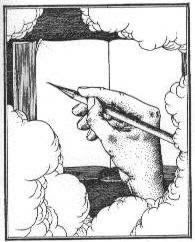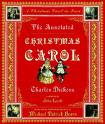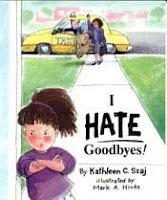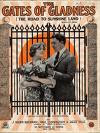
"How come you're always so slow?" my 7-year-old friend asked me, leaning on her scooter. "I got here long time ago."
A slight exaggeration. She had zipped ahead on her Razor, hair flying, one foot dipping and pushing, dipping and pushing, arriving at the front of the stairs leading to the sprinklers near our apartment complex only forty-five seconds before.

"I like taking my time," I said. "I'm a writer, and that's what writers do. We notice things."
She fired off one of her looks
—narrowed eyes that say, Uh-huh, whatever you say
—and scooted on ahead again.
That's what writers do? We notice things? Uh-huh, skeptic-self muttered. Well, we do, argued writer-me.
Except when we don't...when I don't.
Like when I'm chasing so many thoughts in my head while showering that I can't remember where I washed and where I didn't. As a result, I've had lots of sniffing practice: where do I smell like soap? Right arm? Check. Left arm? Check. (As for the parts I can't reach with my nose, well, let's just say a little extra washing never hurt me yet.)
Or when I'm walking down a New York City street, mentally whirly-gigging at high speed while doing errands.
Notice things? Suddenly I look up: how
did I get here? I don't remember seeing the blocks I know I must have passed.

Yes, I'm glad I'm capable of sustained thinking, focusing so intently that sometimes I hardly notice New York's wailing sirens and screeching bus brakes. (Yet on other days,
not noticing the City's clamor is just not on my menu of possibilities.)
But the
non-stop thought cranking
—which Zen Buddhists call "monkey mind"
—can't be a hospitable host to my favorite guests. Understanding. Insight. Connection. Creative breakthrough. Peace. Wisdom.
Instead of paying awesome attention, listening to what my life and Life itself want to say, I'm pulled into a parade of thoughts marching, marching one after another, a few demanding ones pushing rudely to the head of the line.
The problem is, the parade doesn't know when to quit, circling right back to march again and again, nagging: What do I do about ___? When do I ___? Should I ___? How much ___? When did I ___?

The problem is, anxiety, worry, distress, stress are conducting the parade music.
Round and round we go.

Fretting, fuming, fussing: I'm not getting enough done, not finding enough time or good ideas, not
being enough, period. A thought hamster running around and around a "not-enough wheel" in my head.
How to stop, nobody knows.As for what I really want: seeing, listening, creating, and writing in flow...? Where are they? Hiding, of course, waiting for the hideously squeaking thought wheel to halt.
Wait... I just remembered: I DO know how to stop this ride and that parade. Hallelujah! Just by switching to a simple, few-minute practice that always quiets me. Even in the midst of rushing, crushing New York City.
Ready to climb aboard? Good.
Then please, take a seat on the "Ten Zen Seconds" tour bus about to depart.

I picked up the book and read the back cover. I would find "instant c

alm in only 10 seconds" by reciting "12 incantations...?"* That's what therapist/creativity coach Eric Maisel's book,
Ten Zen Seconds: Twelve Incantations for Purpose, Power and Calm, promised.
Uh-huh, whatever you say.
Sure, I'd worked with slow deep breathing and saying positive statements as separate experiments, with the former producing far better results than the latter. But how could combining the two make an appreciable difference? I shrugged and bought the book anyway. Might be fun to try someday.
And then, one day, after a disastrous teaching experience, I found myself in enough desperation do-do that any doubts about
Ten Zen Seconds no longer mattered.
On that gray, late winter day, I had stood in the conference room, leading the first session of a two-part corporate writing workshop. Accustomed to cooperation from and, often, enthusiastic participation of my students during many years of teaching, I was shocked to be the recipient of obnoxious, resistant behavior from the employee participants. Clearly, they did not want to be in that room with me, doing that workshop. I was nearly ready to grant them their wish.
We survived the session, but for days afterward my mood swung like a pend

ulum, from how-dare-they! anger to how-can-I-fix-this? determination
—and back again. I grabbed the
Ten Zen Seconds book. A survival manual for the upcoming second session...?
At minimum, perhaps working with the incantations would release enough stress steam so that I could get through the workshop in one piece.
I didn't receive my hoped-for minimum.
Instead, a breath-taking maximum took hold and brought me back...to paying awesome attention.

Early

in the morning of workshop session two, I climb aboard the bus that will take me to my client's corporate location. The vehicle hardly pulls out of its Manhattan bus terminal slot when I begin to say the dozen
Ten Zen statements, following the directions: recite 1/2 of each statement while inhaling for five seconds, followed by the statement ending as I exhale for five seconds.
I am completely / stopping.
I expect / nothing.
Inhale, exhale, moving through all twelve incantations.
I am / doing my work.
I trust / my resources.
(Yes, I still doubt. But I have nothing to lose, and a great deal to gain.)
I feel / supported.
I embrace / this moment.
I check in with myself after the recommended one complete round. Okay, I feel a bit better, but not enough to sustain me for the next eight hours. I begin repeating a second round of all twelve statements, as before, splitting each into two parts, five seconds breathing in, five seconds breathing out.
I am free / of the past.
I make / my meaning.
Then, a third round.
I am open / to joy.
I am equal / to this challenge.
The miles move past my window, and still I inhale and exhale, now speaking each sentence from memory.
I am / taking action.
I return / with strength.
Suddenly, I know it's time to stop the process. I feel completely calm and relaxed, all tiredness and anxiety gone. I test the results. I deliberately imagine the participants, including the most resistant ones. I recall the pain of the first session, looking for a leftover "ouch." No reaction. I remain serene and quietly assured of my skills. Best of all, I am sweetly unattached to any specific workshop outcome. I no longer clutch the customized workshop notebook I'd worked such long hours to create.
Soon after, I stand in front of the participants, recapping the first session's main content points. Now I am seeing them with different eyes, eyes that recognize the "bad behavior" of the first session simply as fear. Not of me, but of their jobs (which, I learn, many do not like), workload, and yes, in half of the group, inadequate writing skills.
I have not contracted to work individually with each participant
—which requires hours of private one-on-one assessments and suggestions. But I accommodate the apologetic organizer's request anyway. Easily. Smoothly. Energetically. With awesome attention gladly given to each participant.
Early evening. I am sitting in the bus again, homeward bound. An imaginary bouquet of many real thank you's and several requests for a return engagement accompanies me.

I breathe in and out, slowly and deeply, this time in gratitude.
I am a writer and teacher who, at my best, takes time to notice things... including when my thought wheel is frantically spinning, and the frenetic parade can't remember how to stop.
.

"Before I can tell my life what I want to do with it,
I must listen to my life telling me who I am."
—Parker Palmer, Let Your Life Speak 
* Here's the complete list of
Eric Maisel's twelve Ten Zen "incantations" with breathing in /breathing out breaks. Try the process the next time you need to turn off stress and turn on awesome attention. And yes, please do let me know what happens.
(Small confession: though the author suggests using the wording as given, I tweaked two of the twelve statements for a better personal fit. Hey, I'm a writer!)
I am completely / stopping.
I expect / nothing.
I am / doing my work.
I trust / my resources.
I feel / supported.I embrace / this moment.
I am free / of the past.
I make / my meaning.
I am open / to joy.I am equal / to this challenge.I am / taking action.
I return / with strength.(Incantations printed here with permission of author Eric Maisel.)




























